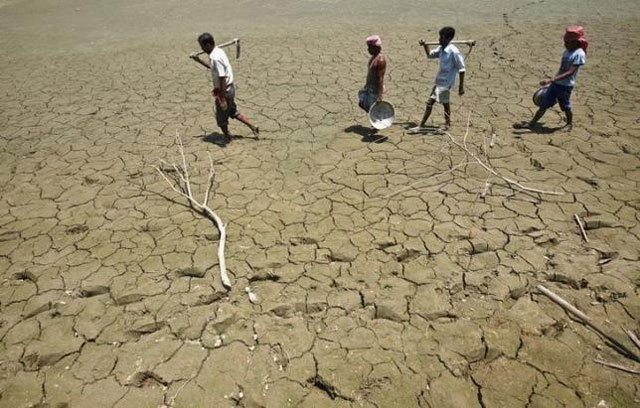
The farmer, now 60, began commuting an hour and a half from his village to Jhansi town in Uttar Pradesh state for a job that paid little money.
"I was working as a labourer in Jhansi for survival," said Karna, who goes by one name. "When my son fell ill, I had no other option but to sell my blood for his treatment."
The hospital took almost two bottles of his blood and gave him 1,200 rupees ($17.50).
For many farmers in this part of Bundelkhand, blood is the new cash crop - a source of guaranteed income as they exhaust other ways of making ends meet.
In India, blood donors are not usually paid. But some hospitals buy blood, even though it is against the law.
Bundelkhand, a hilly region divided between the states of Madhya Pradesh and Uttar Pradesh, has struggled with extreme weather in the past few years.
India's powerful farming lobby turns on Modi
Drought, hailstorms, unseasonal rainfall and most recently an unusually warm winter have played havoc with crop yields, making farming unviable for many.
Unemployment has soared, and locals are leaving the rural belt to work as unskilled labour in nearby urban areas.
Financial assistance provided by the authorities has failed to achieve much on the ground, as it is far lower than farmers' losses.
Farmer Lakhan Ahirwar, 61, relies on intermittent labouring jobs to get through dry spells. But when work is scarce, selling his blood is the most reliable source of income.
"I could not find any work for almost five days," he said. "What should I do? I had to feed my children."
Rajendra Singh, a prominent water conservationist and winner of the Stockholm Water Prize, said it was "a matter of grave concern that farmers from many areas in Bundelkhand (have) sold their blood due to successive droughts".
Hidden plight
Ahirwar, who once earned enough by selling tomatoes, potatoes and chillies grown on his 7 acres (3 hectares), is no longer in a position to provide two meals a day for his family.
His only son migrated to New Delhi with his pregnant wife.
"Even during the eighth month of her pregnancy she had to work as a labourer in Delhi, as they had no other source of income for survival," said the farmer.
Tourists from all over the world who flock to Bundelkhand to visit Khajuraho, a world heritage site famous for its temples adorned with erotic carvings, are largely unaware of the plight of local farmers.
India's Rahul Gandhi leads protest against Modi's land law
The region has received below-average rains since 2007, and is now facing its third successive year of drought. Agricultural production has declined substantially and livestock are suffering too.
Crops in nearly half the districts of Madhya Pradesh have been hit by insufficient rainfall, the state government says.
In neighbouring Uttar Pradesh, the situation is even worse, with 69 out of 71 districts receiving below-average rains in 2015, according to the India Meteorological Department.
Last year, unseasonably heavy rains and hailstorms devastated crops at the ripening stage in April and May in Bundelkhand. That was followed by drought in August and September, and a warm winter.
The freak winter badly affected the rabi crop, sown during the winter months, on around 40 percent of India's farmland.
Two suicides per day
The negative effects have pushed some farmers to commit suicide, even as state governments scramble to ease the agrarian crisis.
More than 3,200 farmers in Bundelkhand alone have killed themselves in the last five years, according to official records. Crop losses and worries over debt are the main reasons.
Local leader Shivnarain Singh Parihar of the Bharatiya Kisan Sangh (Indian Farmers' Union) said around two farmers per day, on average, are committing suicide in Bundelkhand.
Many farmers are forced to borrow money at exorbitant interest rates from private money lenders to buy seeds and fertiliser.
"They are in debt but can't repay (it) and face harassment by lenders. So they are taking the extreme step of ending their lives," said Parihar, who fights for local farmers' rights.
He himself has given money to the families of farmers who committed suicide, because they had nothing left to prepare for a funeral.
Begging on the street
Parihar said Bundelkhand farmers were facing a hunger crisis, and state governments had failed to provide relief.
In late January, Madhya Pradesh Chief Minister Shivraj Singh Chouhan said all possible help would be provided to farmers in areas with a rainfall deficit.
The state government said it had already deposited around $550 million in farmers' accounts. But in Uttar Pradesh, little aid has been offered.
Those lucky enough to receive some money say it is not enough.
For the elderly who cannot find work in the cities, selling blood and begging are perhaps the only choices left.
"I have two children and both of them are now working as labourers. I am too old to do anything, so I am begging to survive," said 80-year-old Moolchand, looking at passersby through sunken eyes. He gets little more than $1 a day.
Around 100 farmers from his village of Badgaon, home to 4,000 people, have resorted to begging amid the repeated droughts.
"Farming is a curse in Bundelkhand," Moolchand said tearfully. "No one cares for us - we will die one day in the absence of any help from the government."

















COMMENTS
Comments are moderated and generally will be posted if they are on-topic and not abusive.
For more information, please see our Comments FAQ